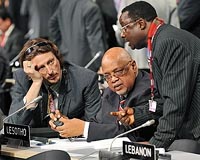| . |  |
. |
Bonn (AFP) May 3, 2010 Stymied global climate talks should shift focus from a polarising debate over a future treaty to immediate concrete action, the UN's top climate official said Monday. A "good outcome" of the UN climate conference slated for late November in the Mexican seaside resort of Cancun would be "an operational architecture on climate change," said Yvo de Boer. "How can we make action work on adaptation, mitigation, technology transfer, capacity building and forests? "Answer this, and then I think we would be in a position to decide if that should be turned into a treaty," he said on the margin of a meeting of several dozen world environment ministers in Germany. The Petersberg Climate Dialogue in Bonn is the highest-level gathering on climate since the December Copenhagen summit, which fell far short of a deal strong enough to beat back the threat of global warming. "Asking countries, especially developing countries, to sign up to a treaty in the absence of that clarity is like asking somebody to sign a blank cheque," added de Boer, Executive Secretary of the UN Framework Convention on Climate Change. The 11th-hour Copenhagen Accord, hammered out under the threat of failure by a handful of nations, calls for keeping global temperatures from rising more than 2.0 degrees Celsius (3.6 degrees Fahrenheit). The accord also promises 30 billion dollars in "fast track" financing before the end of 2012 for developing countries bracing for the climate change impacts, to be scaled up to 100 billion by 2020. But annexed emissions pledges from some 77 countries -- rich and developing -- would put Earth on track for increases of 3.5 C or 4.0 C, a planetary disaster scenario, according to scientists. And concerns about how the short-term funds will be spent and where long-term funding will come from have cast a long shadow over these commitments. "There is insignificant progress in many industrialised countries in terms of putting in place the kind of policy and legislation that will be needed to achieve these targets," de Boer said. "Fast start financing needs to flow now, and ministers need to indicate how to raise and manage the long-term financing," he said. Echoing statements from rich nations and major emerging economies such as China and India, de Boer suggested that Cancun will be a half-way point to a more comprehensive deal at the end of 2011, or even beyond. Chances are slim to nil, he said, that nations will up pledges to cut carbon emissions enough by year's end to meet the 2.0 C degrees Celsius (3.6 degrees Fahrenheit). "There is some flexibility to raise the ambition levels of the industrialised countries," he said, noting that the European Union was debating whether to boost its commitment from 20 to 30 percent by 2020, measured against a 1990 benchmark. The EU move would help rebuild mutual trust and transparency, "which was very seriously damaged in Copenhagen," he said. "But it will not be enough to get us into the ... range that the scientific community has indicated would give us a 50 percent chance of avoiding the worst impacts of climate change."
Share This Article With Planet Earth
Related Links Climate Science News - Modeling, Mitigation Adaptation
 Ministers huddle in bid to jump-start climate talks
Ministers huddle in bid to jump-start climate talksParis (AFP) April 30, 2010 More than three dozen environment ministers are to meet near Bonn, Germany this weekend in a bid to revive global climate talks left mangled and moribund after the UN summit in Copenhagen. It will be the highest-level political meeting on climate since the much-criticised December conference fell spectacularly short of delivering the binding treaty that nearly all nations say is needed to sp ... read more |
|
| The content herein, unless otherwise known to be public domain, are Copyright 1995-2010 - SpaceDaily. AFP and UPI Wire Stories are copyright Agence France-Presse and United Press International. ESA Portal Reports are copyright European Space Agency. All NASA sourced material is public domain. Additional copyrights may apply in whole or part to other bona fide parties. Advertising does not imply endorsement,agreement or approval of any opinions, statements or information provided by SpaceDaily on any Web page published or hosted by SpaceDaily. Privacy Statement |